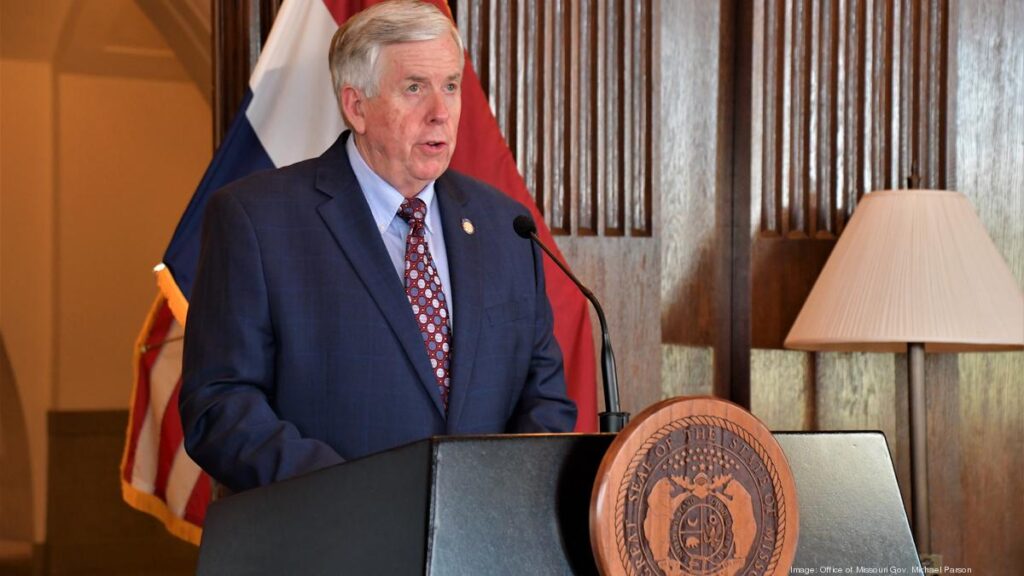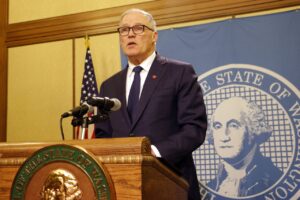Missouri Supreme Court rules governor ‘had intent to violate the law’ in Sunshine Law case
3 min read
The Missouri Supreme Court on Tuesday unanimously ruled Gov. Mike Parson’s administration violated the state’s Sunshine Law when he charged $3,618 in attorney fees and redacted documents when responding to an information request pertaining to former Gov. Eric Greitens.
Judge Patricia Breckenridge’s 27-page opinion overturned a 2019 circuit court ruling in favor of Parson.
Elad Gross, a Democrat and St. Louis attorney who unsuccessfully ran for Missouri attorney general in 2020, sent an open-records request to the governor’s office in August 2018, two months after Greitens resigned. Gross was seeking to gather information on political campaign contributions to Greitens, who is currently running for the U.S. Senate seat of retiring Republican Roy Blunt. Gross argued the governor redacted open public records to avoid providing information pertinent to an investigation of government corruption.
“These allegations sufficiently allege the Governor’s Office had an intent to violate the law,” Breckenridge wrote in her ruling.
Missouri’s Sunshine Law states that meetings, records, votes, actions and deliberations of public governmental bodies be open to the public unless otherwise provided by law.
Gross prepared 10 points in his brief filed with the Supreme Court, but the focus during arguments was the fees.
“I know folks – members of the legislature, citizens groups and individuals – who have been charged these crazy fees,” Gross said. “And there’s no way they can afford these. It’s just being used as a deterrent for folks who are looking to access public records, which is their right under Missouri Sunshine Law.”
News organizations reported the governor’s office and attorney general’s office weren’t commenting on the ruling.
When responding to Gross’ request for records in 2018, Parson’s general counsel at the time, Christopher K. Limbaugh, said 13,569 pages were found and the estimated cost for the records review would be $3,618.40, equating to 90.46 hours at $40 per hour. Limbaugh requested a check and said once received, “we estimate that it will take at least 120 business days to complete the request.”
Gross then made a second Sunshine request, asking for all records pertaining to the governor’s office’s response to his first request. The governor’s response was about 60 pages with redactions.
After losing in circuit court, Gross represented himself before the Supreme Court on Feb. 3. Groups filing amicus briefs in favor of Gross included the Sunshine and Government Accountability Project, the American Civil Liberties Union of Missouri, the Freedom Center of Missouri, the Kansas City Star, St. Louis Post-Dispatch, the Missouri Press Association and the Missouri Sunshine Coalition. Those filing briefs in favor of the governor were the Missouri Municipal League, Missouri School District Association, Missouri Association of Counties, and the International Municipal Attorneys Association.
Judge Breckenridge agreed with nine of 10 points argued by Gross. She said the tenth should have been brought up at the circuit court. Her opinion stated either the governor’s office violated Sunshine Law or the circuit court ruled in error when:
- Requiring Gross to pre-pay an estimate of costs for his first request that included attorney review time;
- Failing to provide him with the earliest date upon which the records in his first request would be available;
- Failing to provide him with a detailed explanation of why it required at least 120 business days to produce documents in response to his first request;
- Redacting certain records in response to his second request without explanation and without closing any records;
- Stating it wasn’t the governor’s office’s burden to demonstrate compliance with the law when redacting public records;
- The governor’s office knowingly violated the law;
- The governor’s office purposely violated the law.
“Three years ago when I asked for these records, I was not very familiar with Missouri Sunshine Law and it has been quite an experience and learning,” Gross said. “I’m very happy with the opinion. I’m very happy that anybody who’s interested in transparency in government will get to use this as a tool.”
This article was originally posted on Missouri Supreme Court rules governor ‘had intent to violate the law’ in Sunshine Law case






